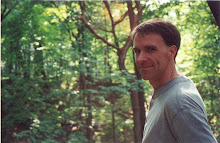Tucson, Arizona: The City
Ned was short and square-shouldered, with shaggy dark hair and a full beard. His brown eyes measured everything. We arranged to meet at his law office in the old yellow stucco Steinfeld mansion. 
"It was a nunnery for a period of time," he said of his workplace. "It was also a house of ill repute. Hopefully," he added with a sly smile, "those two didn't overlap."
"You probably saw some of the other homes in this area," he continued. "It's a beautiful place, but this neighborhood experiences a lot of crime. The train tracks are down at the end of the street, and they have to slow down to go through Tucson. It's the only big town around. A lot of hoboes and rail riders hop off at night."
We headed to a Tucson legend, the Mexican restaurant El Charro. The dark wood walls were adorned with Western memorabilia: old road signs, weathered wood, etc. Hip-hop music blared out of the sound system as we sat at a blond wood table and ate some of the best Mexican food I have ever had.
"I would say," Ned slowly answered my question of Tucson's Hopperesque isolation, "compared to some of the places I've seen, that people here that I interact with are not isolated. I think you've seen, just being here a couple of hours, that people tend to be social and friendly here. Maybe it's by virtue of being out in the middle of nowhere. Maybe it's sort of the mentality that 'hey, we're all stuck together here in the desert.' Maybe that sort of cooperation and interaction is necessary to eke out a survival here. That might be a hangover from previous times. People in this area have a sort of pioneer psyche. I like hiking," he offered as evidence of the desert's influence, "and when I'm just out of town, I feel like I'm out in the middle of nowhere." 
"You have a background in psychology," I noted. "Do you think there is anything about American psychology in Hopper's paintings?"
"Well," Ned coughed, "I didn't study clinical psychology, and I'm not sure my background in psychology gives me any special perspective about whether Hopper captured some sort of essence of our American psychology. I think all people are basically on their own. Sometimes you find yourself in your life getting to a point when all the options run out. Because of the way that we immigrated to this country and the way that we moved through it (to the west), I think there was a sense of isolation here that was different from other place. We've always been a country that encouraged individuals being on the cutting edge and going out and pushing the frontier. It's always been a pride in that expansionism. We're a very mobile society. In Europe, family essentially stayed in the same area as far back as you can go. Especially nowadays, people are more mobile than ever. If you go somewhere else and you don't have that sort of family network, it can be more difficult. People coming here left community and family behind. When they did get here, they dispersed. Maybe you stayed east and your bother moved west. And your son went off to college and never came back. This is a big country: physically, a big country." 
I said, "You could be in D.C. and say, 'I'm going to California,' and according to the U.S. 'you're still under our jurisdiction.' But that trip is further than from Moscow to Barcelona. It should be some sort of culture shock, but instead you find the same McDonald's."
"Yeah," Ned agreed, "nowadays. No matter how much the country moves toward that sort of McDonald's society, with big box stores, and national chains taking over mom-and-pop places and eradicating some of the local color and flavor, a lot of places still seem to have their own feel. Despite the fact that we have the national news and all the same television programs and all this stuff that ought to be pointing us to a narrow bandwidth of experience, there seems to still be a lot of things that are unique to different parts of the country. People might say, 'we're having such-and-such for dinner.' And you're like 'what is that?' They can't believe you never heard of that. Because everybody there has had it. If you go anywhere in the country, there's Home Depot and McDonald's, and you have a feeling of familiarity. But if you dig underneath that, you'll find things that are unique to that area that are a part of that area's culture. It might be that the people who go to Applebee's three nights a week, still go two nights a week to LoDuca's--a mom-and-pop place that they like in addition to the chains." 
20090515
244 Tucson, AZ: The City
Subscribe to:
Post Comments (Atom)




No comments:
Post a Comment